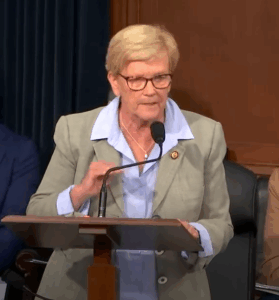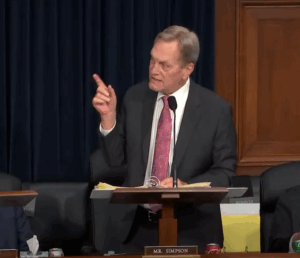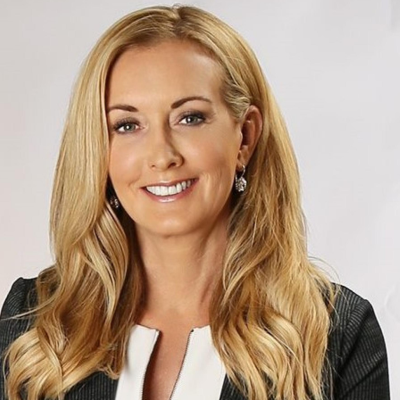After contentious US committee vote, Bayer and allies a step closer to new federal protections for pesticides
A group of US lawmakers failed on Tuesday to beat back a provision in a congressional appropriations bill that would help protect pesticide makers from being sued and could hinder state efforts to warn about risks of pesticide products.
Led by US Rep. Chellie Pingree, a Democrat from Maine, multiple lawmakers spoke at Tuesday’s House Committee on Appropriations meeting urging passage of an amendment striking a rider from a fiscal year 2026 appropriations bill that critics say effectively gives pesticide manufacturers immunity from consumer lawsuits seeking compensation for product harm. But a majority of committee members voted against the amendment.
The language of the rider Pingree and allies were attempting to strike blocks federal funds from being used to “issue or adopt any guidance or any policy, take any regulatory action, or approve any labeling or change to such labeling” inconsistent with the conclusion of an Environmental Protection Agency (EPA) human health assessment.

Critics say the language impedes states and local governments from warning about risks of pesticides even in the face of new scientific findings about health harms if such warnings are not consistent with outdated EPA assessments. The EPA itself would not be able to update warnings without finalizing a new assessment, the critics say.
And because of the limits on warnings, consumers would find it difficult, if not impossible, to sue pesticide makers for failing to warn them of health risks if the EPA assessments do not support such warnings.
The protections provided in the rider are part of a push by Bayer, the maker of glyphosate weed killers such as Roundup, and a coalition of pesticide and farm industry interests, to head off costly litigation.
Bayer has paid out billions of dollars in settlements in recent years to people who claim they developed non-Hodgkin lymphoma from exposure to the glyphosate herbicides the company inherited when it bought Monsanto in 2018. The company still is wrestling with more than 60,000 additional lawsuits. Syngenta, another large agrochemical company, likewise is being sued by thousands of people across the United States who allege their use of the company’s paraquat weed killers caused them to develop Parkinson’s disease.
“Insidious” and “dangerous”
US Rep. Deborah Wasserman Schultz, a Democrat from Florida and a breast cancer survivor, said in Tuesday’s committee hearing that she sees the rider as “insidious” and “dangerous” and she refuses “to stand by while we let corporate lobbyists write language that muzzles states and leave families in the dark about real risks to their health.” Pingree’s amendment would protect public health, she said.
“Let’s rip this rider to shreds. Let’s send a clear message that we will not allow corporate polluters to hide the truth about cancer-causing chemicals and we will always fight for public health above corporate wealth,” Wasserman Schultz said.
Pingree told the committee that her amendment would “not take away pesticides” but would ensure that state and local governments can provide residents with “up-to-date safety information” and ensure “that chemical companies can be held responsible for failing to provide relevant safety information.”
She said her amendment would not change any existing policy, but the rider backed by Bayer would.
“We want to make sure our families stay healthy, we want to make sure our communities are healthy, we want to make sure the very farmers who interact with these chemicals are also healthy and know the dangers of the chemicals they face,” Pingree said in urging the committee members to support her amendment.
Wagging a finger
US Rep. Mike Simpson, a Republican from Idaho who chairs the House Interior and Environment Appropriations Subcommittee, spoke out against Pingree’s amendment and in favor of the rider, wagging his finger at Pingree and complaining of what he said is “misinformation” about the purpose of the rider.

Simpson said the language of the rider would have a very limited impact and merely deals with the “interstate commerce” part of labeling and would not stop states from barring a chemical from being sold in its state.
He acknowledged that the rider was opposed by increasingly vocal and influential members of the “Make America Healthy Again” (MAHA) movement, but said those critics are not correctly interpreting the issue.
“I understand the confusion that is being spread,” he told the committee. “I know the MAHA moms have been calling … I think we ought to make America healthy again … but they’re getting so much misinformation about what this does.”
The decision by committee members to vote down Pingree’s amendment drew the ire of public health groups.
Food & Water Watch Senior Food Policy Analyst Rebecca Wolf said in a statement that the “despicable vote” will undermine public health and enable pesticide corporations “to profit off dangerous chemicals” while preventing the public from “being any the wiser about the risks to their own health.”
“There is hardly a family in America untouched by cancer, a disease repeatedly linked to industrial agriculture,” she said.
The bill heads to the House floor after the August recess but Food & Water Watch and other organizations are now largely looking to the US Senate to reject the efforts.
Bayer and its coalition are also pushing for changes in state laws that would hinder lawsuits over pesticide harms, and have succeeded so far in two states.
PFAS contamination
In a separate debate in Tuesday’s committee meeting, Pingree also failed to garner sufficient support to strike language in the appropriations bill that would prohibit the use of any EPA funds to “finalize, implement, administer, or enforce” the agency’s draft assessment on two harmful types of per- and polyfluoroalkyl substances (PFAS).
The EPA’s assessment on perfluorooctanoic acid (PFOA) and perfluorooctanesulfonic acid (PFOS), released in January concluded “there may be human health risks” from PFAS-tainted sewage sludge fertilizer, and outlined a series of steps the agency would take to address the pollution. PFOS and PFOA are linked to a variety of health problems, including certain cancers and immune system and reproductive harms.
Pingree said the amendment was needed to allow the EPA to continue its important assessment of PFAS, which are increasingly being found to be contaminating farms, ranches and dairies around the country, as well as drinking water supplies for millions of people.
Simpson said he opposed Pingree’s amendment because it is “unnecessary” and said the EPA remains committed to addressing PFAS problems, and the majority of committee members voted in opposition to the amendment.
The House appropriations committee bill reduces overall EPA funding by 23%.
(Featured photo by Getty Images for Unsplash +.)




